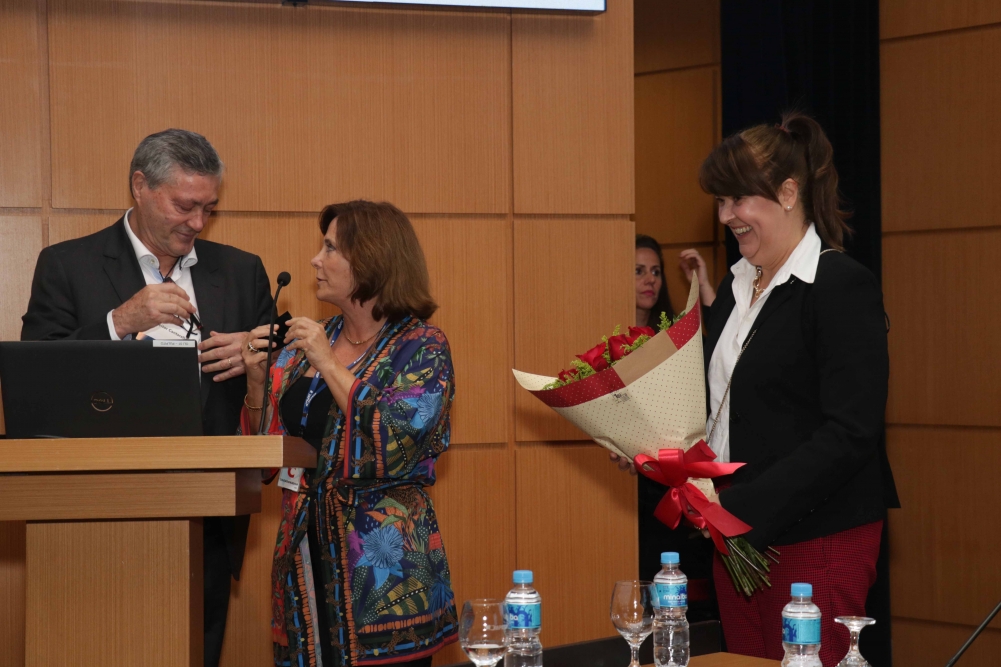

Heitor Cantarella (left) and BIOEN steering committee member Gláucia Silva (right); photo credit: Felipe Maeda/Agência FAPESP
Heitor Cantarella was a member of BIOEN-FAPESP’s steering committee for 14 years. As a researcher at the São Paulo State Institute of Agronomy in Campinas, he has made groundbreaking contributions to efforts to reduce greenhouse gas emissions in agriculture.
Heitor Cantarella was a member of BIOEN-FAPESP’s steering committee for 14 years. As a researcher at the São Paulo State Institute of Agronomy in Campinas, he has made groundbreaking contributions to efforts to reduce greenhouse gas emissions in agriculture.

Heitor Cantarella (left) and BIOEN steering committee member Gláucia Silva (right); photo credit: Felipe Maeda/Agência FAPESP
By André Julião | Agência FAPESP – Heitor Cantarella was warmly praised by friends, colleagues and collaborators at an event held to celebrate his contributions to several of FAPESP’s research programs. He was a member of the steering committee for the Bioenergy Research Program (BIOEN) for 14 years. His illustrious scientific career includes a PhD earned in the United States, years of research conducted at the São Paulo State Institute of Agronomy (IAC) in Campinas, supervision of master’s and doctoral students, and many publications in high-impact journals. His work on greenhouse gas emission reduction in agriculture has been groundbreaking.
The event took place on August 10 in FAPESP’s auditorium and was live-streamed on YouTube. “Hydrogen from ethanol is most viable for São Paulo, but this requires low emissions. It’s a crucial agenda and initially wasn’t part of BIOEN’s scope. Cantarella’s outstanding achievements include putting these issues on the agenda, where they’ll remain for years to come. On behalf of FAPESP’s leadership, I want to thank him for his contributions,” Carlos Américo Pacheco, Chief Executive Officer of FAPESP, said in his opening remarks.
Glaucia Souza, a professor at the University of São Paulo’s Institute of Chemistry (IQ-USP) and a member of BIOEN’s steering committee, stressed the alignment of Cantarella’s and the program’s trajectories. When BIOEN was launched in 2008, eight projects were considered, heightening the researchers’ interest in broadening the program’s scope. As a result, it now has 234 projects, with 48% of Thematic Projects and Regular Grants focusing on biomass and sustainability.
“Heitor applied knowledge of agricultural engineering and also a vision of the sector’s potential sustainability. The program’s vision of sustainability has Heitor’s DNA,” she said. “Being associated with BIOEN presupposes commitment and love of the field. We’re strong advocates for bioenergy, we believe deeply in its potential, and we do what we do with tender loving care. This is why FAPESP is recognized as an institution that supports the development of São Paulo and the needs of Brazil. This agenda requires more and more knowledge, for energy production and a transition to sustainability.”
Transformational capacity
For Luiz Augusto Horta Nogueira, a researcher at the State University of Campinas’s Interdisciplinary Center for Energy Planning (NIPE-UNICAMP), bioenergy’s huge potential can only be used if qualified people are working toward this goal. “I always think of energy as transformational capacity. The energy in biomass has an enormous impact. It can be used to improve the quality of life and foster sustainable development, but none of this is possible unless people are actively promoting it. Cantarella did so and continues to do so now,” he said.
Closing the event, Cantarella thanked the friends, colleagues and collaborators present. “I’m greatly honored to receive this homage from FAPESP. It’s very special because it comes from a model research funding institution. I’ve spent 20 years serving on various committees here at FAPESP, and I’m extremely grateful for the opportunity because it has enabled me to work alongside the cream of researchers in São Paulo state. It’s been a school for me and has changed my professional life. Thank you very much indeed.”
The other speakers were Luis Fernando Cassinelli, also a member of BIOEN’s steering committee; Plinio Nastari, President of Datagro; Jose Antonio Quaggio, a researcher at IAC; Eiko Kuramae, Netherlands Institute of Ecology; Victor Vargas, Yara Brasil S.A.; Luis Felipe Ferreira, Sabic – Agri-Nutrientes; and former students Késia Lourenço and João Carvalho, representing colleagues who sent videos with reminiscences. The meeting was chaired by Raffaella Rossetto, a researcher at IAC and a member of BIOEN’s steering committee.
The organizers took the opportunity to announce that the Brazilian Bioenergy Science and Technology Conference will be held in São Paulo on October 22-24, 2024, by BIOEN in partnership with the International Energy Agency (IEA). Cantarella will chair the conference.
A recording of the event can be watched at: https://www.youtube.com/watch?v=-3ou1VgdzvQ.
Republish
The Agency FAPESP licenses news via Creative Commons (CC-BY-NC-ND) so that they can be republished free of charge and in a simple way by other digital or printed vehicles. Agência FAPESP must be credited as the source of the content being republished and the name of the reporter (if any) must be attributed. Using the HMTL button below allows compliance with these rules, detailed in Digital Republishing Policy FAPESP.





